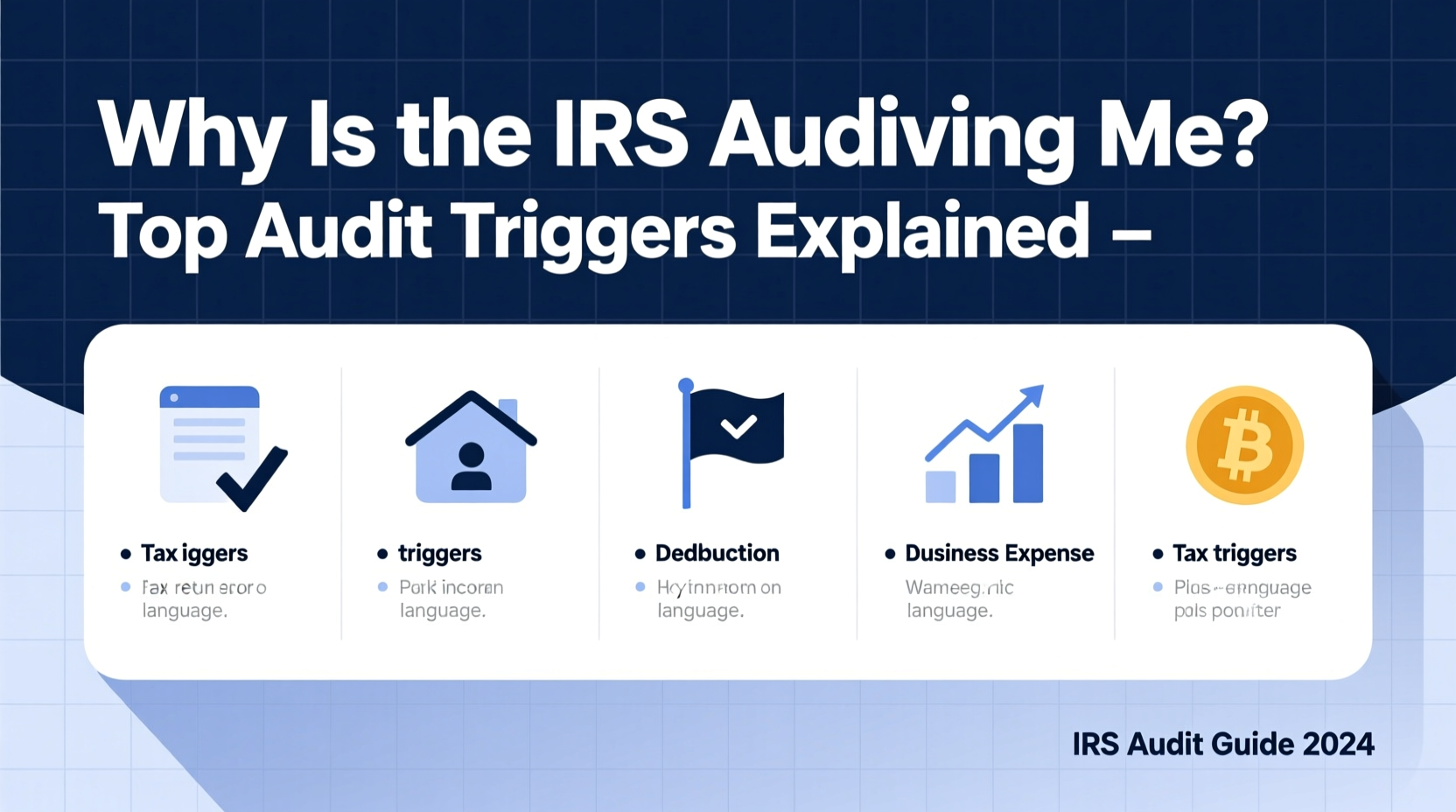If you’ve received a letter from the Internal Revenue Service or suspect your return has drawn attention, you’re likely asking: Why is the IRS auditing me? While not every inquiry leads to a full audit, understanding the most common triggers can help you assess your risk and take steps to protect yourself. The IRS uses sophisticated algorithms and historical data to identify returns that deviate from the norm. Some red flags are obvious; others are subtle but equally significant. This guide breaks down the leading reasons behind IRS audits, offering clarity, real-world examples, and practical strategies to reduce your exposure.
Common Reasons the IRS Targets Tax Returns

The IRS doesn’t audit taxpayers at random—though it may feel that way. Instead, it relies on a scoring system called the Discriminant Information Function (DIF), which assigns a score based on anomalies in your return. Higher scores increase the likelihood of scrutiny. While high income plays a role, behavior matters more. Certain patterns consistently raise suspicion, especially when they suggest underreporting of income or inflation of deductions.
Discrepancies Between Reported and Third-Party Income
One of the most frequent triggers occurs when the income you report doesn’t match what employers, banks, or financial institutions have reported to the IRS. For example, if your W-2 shows $65,000 in wages but you report $55,000, the mismatch will be flagged instantly. Similarly, 1099 forms for freelance work, investment income, or retirement distributions are cross-checked automatically.
Excessive or Unusual Deductions
Deducting business expenses is legal—but doing so at rates far above industry norms raises eyebrows. For instance, claiming $15,000 in home office deductions on a $40,000 income may seem disproportionate. The IRS compares deduction levels across similar professions using data from the National Research Program.
Cash-based businesses—like restaurants, salons, or repair services—are particularly vulnerable. If your reported expenses consume nearly all your revenue, the IRS may suspect unreported cash income.
“Businesses reporting consistent losses year after year attract attention because the IRS questions whether they’re truly operating for profit.” — Sarah Lin, CPA and IRS Audit Specialist
Top 5 IRS Audit Triggers You Should Know
Audit triggers aren't always avoidable, but awareness helps you prepare. Here are the five most common reasons returns get flagged:
- High Income Levels: Taxpayers earning over $200,000 face audit rates several times higher than average. In 2022, about 1% of returns with income above $500,000 were audited, compared to 0.2% overall.
- Self-Employment and Gig Work: Independent contractors often underreport income or overclaim vehicle and home office deductions. The IRS scrutinizes Schedule C filers closely.
- Round Numbers on Deductions: Claiming exactly $5,000 for charitable contributions without receipts looks suspicious. Detailed records justify amounts like $4,832.
- Frequent Foreign Accounts or Transactions: Failing to file FBAR (Foreign Bank Account Report) or Form 8938 when required is a major red flag—even if taxes are paid correctly.
- Claiming the Digital Asset Question Incorrectly: Since 2020, the IRS asks whether you’ve engaged in cryptocurrency transactions. Answering “no” while receiving 1099-Ks from exchanges triggers automatic reviews.
Table: Common Audit Triggers by Taxpayer Type
| Taxpayer Type | Most Common Trigger | Risk Level |
|---|---|---|
| Self-Employed Individuals | Overstated business expenses | High |
| High-Income Earners | Complex investments & offshore assets | High |
| Real Estate Investors | Passive loss claims without sufficient basis | Moderate |
| Remote Workers | Home office deductions with W-2 income | Low-Moderate |
| Charitable Donors | Lack of documentation for non-cash donations | Moderate |
Real Example: How a Small Mistake Led to an Audit
Consider Mark T., a freelance web developer who earned $98,000 in 2022. He claimed $32,000 in business expenses, including a $7,500 \"equipment\" category with no itemization. He also deducted 75% of his internet and phone bills using an estimated usage percentage. When the IRS matched his 1099-NEC income against his Schedule C, the expense-to-income ratio stood at 33%, well above the 18% median for IT freelancers.
The IRS sent a CP2000 notice proposing additional taxes of $6,200. Mark had kept minimal records. Without invoices or logs, he couldn’t substantiate most claims. After months of correspondence, he settled with a $3,800 assessment plus penalties. His experience underscores a key rule: the burden of proof lies with the taxpayer.
How to Respond If You’re Audited
An IRS audit doesn’t mean you’ve done something wrong—it means your return needs verification. There are three main types: correspondence (by mail), office (at an IRS location), and field (in-person at your home or business). Most are handled via mail.
Step-by-Step Guide to Handling an Audit Notice
- Stay Calm and Read Carefully: Identify which tax year and line items are under review.
- Gather Documentation: Collect receipts, bank statements, invoices, mileage logs, and prior returns.
- Respond by the Deadline: Missing deadlines can result in default assessments.
- Consider Professional Help: A CPA, enrolled agent, or tax attorney can represent you and improve outcomes.
- Keep Copies of Everything: Send documents via certified mail and retain duplicates.
Checklist: Reduce Your Risk of an IRS Audit
- ✅ Double-check all income entries against W-2s and 1099s
- ✅ Keep detailed records for all deductions, especially travel, meals, and home office
- ✅ Avoid rounding large deduction amounts
- ✅ File FBAR and FATCA forms if you have foreign accounts over $10,000
- ✅ Report all cryptocurrency sales and exchanges accurately
- ✅ Use accounting software to maintain clean books if self-employed
- ✅ Consult a tax professional before claiming aggressive positions
Frequently Asked Questions
Can I be audited even if I use a tax preparer?
Yes. Using a professional doesn’t shield you from audit liability. However, returns prepared by CPAs or enrolled agents tend to have fewer errors and better documentation, reducing risk.
How long does the IRS have to audit my return?
The IRS generally has three years from the date you filed to initiate an audit. However, if you underreport income by more than 25%, the window extends to six years. Fraudulent returns have no statute of limitations.
Does amending my return trigger an audit?
Not necessarily. Amended returns (Form 1040-X) are reviewed separately and less frequently audited than original filings. However, changes involving large refunds or new deductions may prompt scrutiny.
Conclusion: Stay Prepared, Not Paranoid
Understanding why the IRS might audit you isn’t about fear—it’s about empowerment. Most audits stem from preventable issues: mismatched income, poor recordkeeping, or exaggerated claims. By filing accurate returns, keeping thorough documentation, and knowing what raises red flags, you significantly reduce your chances of being targeted. If you do receive a notice, respond promptly and professionally. Remember, the goal of the IRS is compliance, not punishment. With the right habits and support, you can navigate tax season confidently and keep your finances secure.









 浙公网安备
33010002000092号
浙公网安备
33010002000092号 浙B2-20120091-4
浙B2-20120091-4
Comments
No comments yet. Why don't you start the discussion?